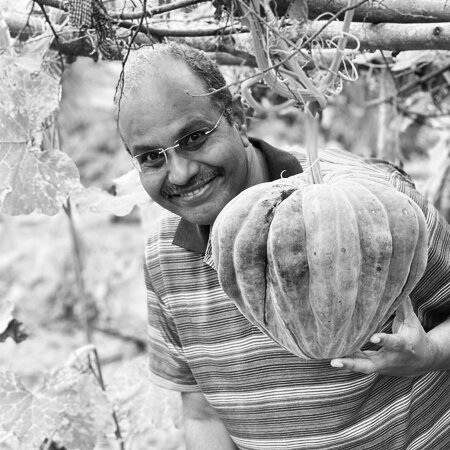If you’ve ever wondered how food travels from the farm to the market to your plate and what are the different forces that shape the food culture of Bengaluru city, then this workshop is for you!
Spread over 2 days, Who Feeds Bengaluru (WFB) was an exploration into different forces that shape how the city of Bengaluru eats. It was a participatory research project fueled by collective community thinking and doing, to get a clearer idea of the people who feed Bengaluru.
DAY 1: The first day had a series of 30-minute talks followed by a 15-minute Q&A session.
TALES FROM A SEEDKEEPER
By Dr. Prabhakar Rao, Hariyalee Seeds
Dr. Prabhakar Rao will talk to us about the city’s indigenous seeds and edible plant biodiversity, why it’s now disappearing and what we can do to preserve our future.
Dr. Rao has been a SEED KEEPER for over 25 years, collecting indigenous native vegetable seeds that are on the brink of extinction. His travels have taken him to remote parts of the world where his interactions with the older generation of farmers has allowed him access to these forgotten varieties. Returning to India in 2011, he conducted extensive testing of over 500 such varieties in his farm in Bengaluru, for genetic stability and environmental suitability. He has now successfully stabilized around 140 rare indigenous vegetable varieties, collected from both within the country and abroad. From his farm Hariyalee Seeds, he now reaches out to other passionate Seed Keepers, Farmers and Urban Gardeners, and collectively works towards the preservation and propagation of these rare vegetable varieties that are on the brink of extinction.
THE OLERICULTURE THAT INFLUENCED RESTAURANT CULTURE
By Nameet M, Sakura Fresh
Nameet will share with us how the idea of first agro began and how growing plants for flavour changed the way Bangalore’s chefs and restaurants were creating and serving food.
Nameet is the Co-Founder and Chief Production Head at First Agro. He is both a farmer as well a commercial pilot, a unique background which blends two distinct passions well. Nameet is a subject matter expert in Olericulture (science of vegetable growing), hydroponics and Integrated Pest & Disease Management who had pioneered the Zero Pesticide™ cultivation globally by using natural methods, a hands-on experience gained by working with commercial growers in British Columbia, Canada over many years.
A CITY OF PLANT-BASED IDENTITIES
By Spurti Ravi, Chief of R&D, Goodmylk
Spurti will share with us a history of the vegan movement in Bangalore, talk to us about the terminologies (vegan, plant-based) and what creative products are being made from plants in Bangalore city to address nutritional and the environment.
Spurti grew up in Bangalore, India with a keen interest in food, flavours and where it came from as she spent her childhood days on farms and plantations. She often travelled across the country and globe in search of hidden gems when it came to local cuisine and it always remained a passion and hobby of sorts. As Chief of Research & Development, Spurti now leads product conception, development, commercialization and manufacturing for Goodmylk, a plant-based dairy alternatives start-up based out of Bangalore that is set to revolutionize this category for a very picky Indian consumer that absolutely loves their dairy products also wants to do better for the planet and the animals.
HOW TO GET YOUR HANDS DIRTY - VIRTUALLY
By Gitanjali Rajamani, Farmizen
Technology is shaping the way we interact with food in many different ways. Gitanjali tells us how Farmizen works and why is it important to be closer to the plants we eat?
Gitanjali Rajamani is the Co-Founder and Chief Operating Officer at Farmizen, which is an agri tech company focused on connecting farmers directly to consumers. She is also the Founder and CEO of GreenMyLife, an urban gardening and landscaping company. Prior to taking the plunge into entrepreneurship, she worked in the Clinical Research space for 12 years handling large scale Pharma operations. She has an MBA in International Management. She is an alum of the Goldman Sachs 10,000 Women program from the Indian School of Business (ISB, Hyderabad), 2016 batch and she was one of the two people globally to win the “Fortune and Goldman Sachs Global Women Leader" award for the year 2018.
URBAN FORAGING 101
By Tansha Vohra, Permaculturist
Foraging in a city is not just picking up random plants off the street. It’s about having a close relationship with your surroundings and people and knowing what plants are growing around in the city, their scientific names and properties, (are they even edible?!), how to taste and cook them. It’s also a great way to explore a city.
Tansha Vohra is currently trying to find solutions to the conundrum of being human in the urbanverse. She quit her full time job in the city to study and practice permaculture. She worked at a permaculture homestead in Goa for a year, and is now trying to grow her own food in her balcony. She is a writer, and she plays with her food before she eats it.
Suggested readings -
‘Who Feeds Bengaluru?’ is supported by the Bengaluru Sustainability Forum. It is organised in collaboration with Edible Issues.
Bengaluru Sustainability Forum is an inter-institutional collaborative initiative that aims to address issues relating to long-term sustainability of urban and peri-urban landscapes. It focuses on public goods and urban commons – including water, air and soil – amongst others.
Edible Issues is a food systems collective fostering thought and action on the Indian food system innovation, through public participatory events, research projects, meetups, and more.
Thank you for visiting PHYTOPIA. We would love for you to share your thoughts and experience about this programme here!






